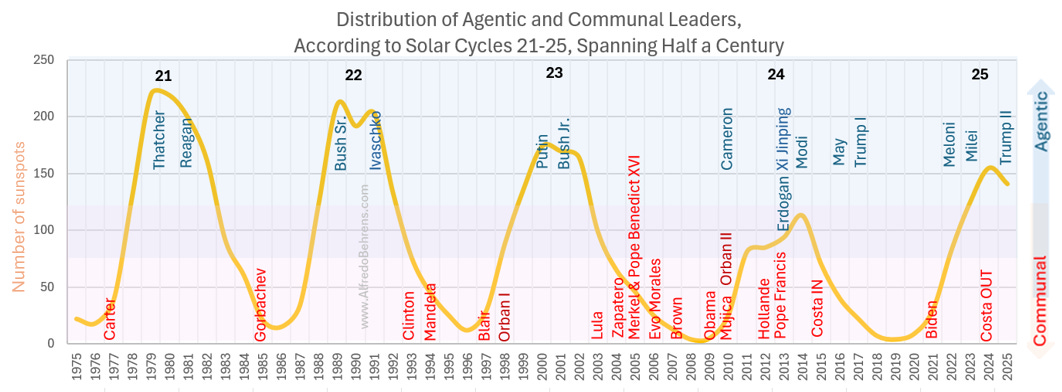How the Sun shapes our Leaders
Rethinking political leadership through the rhythms of Agency, Communion—and sunspots
Icons of the Sun: Why Leadership Changes With the Sky
In December 2013, thousands of young Turks gathered in Istanbul’s Gezi Park to protest the planned demolition of one of the city’s last green spaces. What began as a modest environmental sit-in soon morphed into a larger call for dialogue, inclusion, and shared civic identity. Recep Tayyip Erdoğan, then Prime Minister of Turkey, stood at a crossroads. Having risen to power as a healer of past divisions—promising to reconcile Islam with democracy, and government with the governed—he now had a chance to embrace this communal plea.
Instead, he unleashed tear gas, water cannons, and state media campaigns that framed protesters as existential threats.
That moment marked more than Erdoğan’s political pivot; it hinted at a larger, often overlooked dynamic—one not just political or cultural, but solar. For while we tend to read political events in terms of ideologies, parties, or national histories, there may be deeper emotional tides at play. And those tides, curiously enough, appear to follow the rhythms of the sun.
Beyond Left and Right: Introducing the Solar Pendulum
As we navigate the polarized landscape of 2025, the old Left–Right political spectrum feels increasingly obsolete. This essay offers a new framework that maps leadership along an Agency–Communion axis—while proposing a bold hypothesis: the 11-year solar cycle, marked by the rise and fall of sunspot activity, correlates with shifts in emotional and ideological preferences worldwide.
In essence, high solar activity, as reflected in the high number of sunspots, appears to favor agentic leaders—those who emphasize direction, assertion, and individual or national will. These are figures who promise to act, decide, and impose. By contrast, periods of solar minima favor communal leaders—those who seek unity, inclusion, and healing across difference.
The sun, it seems, not only warms our atmosphere, but subtly warms—or cools—our political temperament.
Understanding Agency and Communion
Agentic leaders foreground the self: they value independence, purpose, and control. They rise by asserting clarity in chaotic times. Thatcher and Reagan were prime examples during the high-activity years of Solar Cycle 21.
Communal leaders, by contrast, focus on the “we.” They rise in times of emotional fragmentation, promising renewal and shared belonging. Their strength lies in soft power, not domination.
But these categories aren’t fixed. Some leaders pivot. Others wear masks. And still others emerge in transitional phases, blending styles or camouflaging intent.
Leaders Are Icons, Not Engines
Before diving into the data, a philosophical note: leaders do not cause the mood of the times. They reflect it.
Whether charismatic or technocratic, rulers do not lead in a vacuum. Even the most authoritarian figures cannot afford to ignore the metaphysical weather. They must resonate with their people's unspoken fears and longings. When they fail to do so, they falter.
Leadership is performance. And like actors on a global stage, leaders succeed when they embody the role history demands—whether healer, warrior, or priest.
“Even the strongest leaders cannot escape the metaphysical weather.”
The Solar Signature of Leadership
The sunspot graph that underpins this theory offers a striking pattern: agentic leaders consistently emerge near the peaks of solar cycles, when sunspot numbers soar above 100. Conversely, communal leaders tend to rise during minimum phases, when solar activity—and emotional volatility—dips.
In 1993, Orban I took the increasing communal role. Orban II, on the other hand came to power with communal overtones in 2010 but quickly morphed into an agentic strongman as the cycle ascended. This transformation wasn’t just political opportunism—it mirrored the declining (1993) and rising (2010) solar phase of his time.
The Dampening Effect of Solar Cycle 24
Spanning 2009–2019, Solar Cycle 24 was unusually weak, with sunspot counts averaging nearly 40% lower than the previous cycles. The emotional resonance of politics during this period was dulled, ambiguous.
Leaders who would ordinarily have fully embraced agentic postures emerged instead under a veneer of communion. Erdoğan, though already authoritarian in tendency, maintained the rhetoric of national healing. Xi Jinping and Pope Francis were both appointed in 2013—a year of modest solar activity—yet embodied radically different energies: Xi, a centralizing autocrat; Francis, a pastoral reformer. The solar climate allowed them both to thrive, despite their ideological divergence.
Even Donald Trump’s first presidency, while agentic in tone, bore the marks of this ambiguity. His assertion of American dominance came filtered through reality-show theatrics and emotional grievance—blunter and less directional than classic agentic archetypes like Reagan.
The Tidal Turn of Cycle 25
We are now entering Solar Cycle 25, with sunspot numbers again surging. The tide has turned, and agentic energies are reasserting themselves forcefully. This explains the sharper polarization, the resurgence of “strongman” rhetoric, and the decline of consensus politics.
But this also brings risks: emotional overheating, institutional strain, and potential overreach by leaders riding the wave of solar-fueled certitude.
Those who can harness this energy without being consumed by it—who can prepare now for the descent to come—will prove most sustainable. Think of it as political seamanship: you must ride the crest but know when to lower the sail.
Forecasting the Future: Practical Applications
For strategists, the implications are profound. Parties can time campaigns, messaging, and leadership choices based on solar dynamics. Take Portugal’s Socialist Party, for instance: their 2025 snap election—run on a communal appeal—occurred at the height of the current solar maximum. Predictably, they suffered a major loss. The cycle was not on their side.
Understanding the Solar Pendulum may not change human nature, but it can change our timing—and in politics, timing is everything.
Not ready to subscribe for pay?





